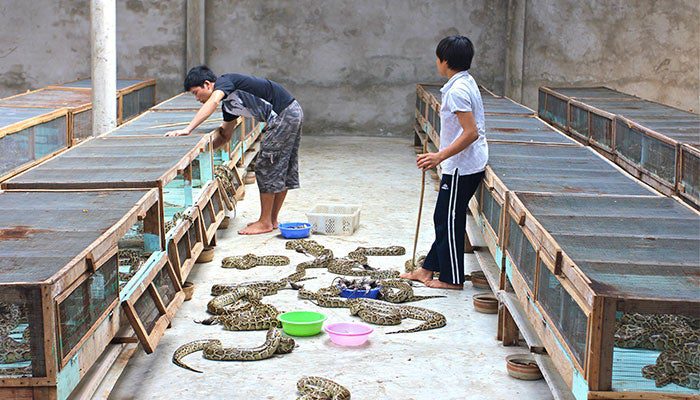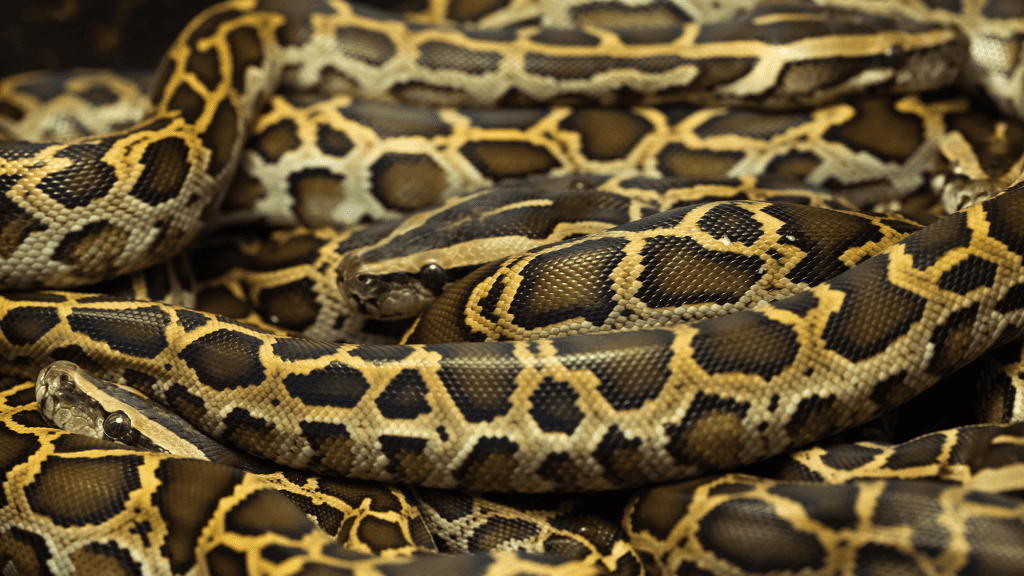The world is in need of a better and sustainable source of meat. This refers to meat that can be produced consistently without causing harm to the environment.. Many The traditional way of raising livestock is considered unsustainable and generally makes the environment worse. Therefore, scientists are looking for new ways to produce food for the growing human population. They are exploring ways to feed and satisfy the increasing human population, as conventional livestock farming is unsustainable and has negative impacts on the environment. They aim to find a sustainable solution. Farmed pythons could potentially provide a low-emission source of protein, offering a solution to the challenges posed by traditional livestock farming, according to a study published in the journal 'Scientific Reports' on March 14. This relates to the potential to provide food for an expanding human population. pythons According to a study published on March 14 in the journal 'Scientific Reports', farmed pythons could offer a low-emission source of protein. This refers to a research paper that was published on March 14 in the journal 'Scientific Reports'. The study was published in the journal 'Scientific Reports' on March 14..
Pythons are not venomous, but they do grow up to 20 feet long and have a lot of white meat that is high in protein. They are considered a delicacy in some Southeast Asian countries. Pythons can reach lengths of 20 feet.This refers to the substantial amount of high-protein white meat found in pythons, which is considered as a delicacy in certain Southeast Asian countries. These snakes have a significant amount of high-protein white meat. This meat is highly nutritious and is considered a delicacy. Venomous snakes have historically been farmed for their venom, but the practice of keeping large quantities of snakes for meat has begun to grow. Farmed snakes are typically set up in large barns surrounded by spaces where they can bask in the sun. Historically, venomous snakes were farmed for their venom, but now there is a growing practice of keeping large numbers of snakes for their meat.This practice is related to the increasing trend of keeping large quantities of snakes for their meat, rather than for their venom. The farmed snakes are typically kept in large barns, with areas where they can bask in the sunlight. The snakes are typically kept in large barns, with spaces designed for them to bask in the sun.

Snake farms could offer a solution, especially in regions where python farming has expanded in recent decades. Although scaling up the farming still faces some challenges, it is worth considering according to the team from the new study. Python farming has already started to expand in recent decades in some regions. In recent decades, python farming has begun to expand in certain regions. The team from the new study believes that, although scaling up the farming still faces some challenges, it is something worth considering.
Daniel Natusch, a study co-author and herpetologist at Macquarie University in Australia, mentioned in a statement that climate change, disease, and diminishing natural resources are putting immense pressure on conventional livestock and plant crops, resulting in severe effects on many people in low-income countries who are already suffering from a lack of protein. This is a statement made by Daniel Natusch, a study co-author and herpetologist at Macquarie University in Australia..
[Related: A team of scientists from various countries conducted a study and claim that their lab-grown 'beef rice' has a pleasant taste. ]
In this studyA team of scientists from Vietnam, Australia, England, and South Africa conducted a study to explore this topic.The scientists examined more than 4,600 pythons on two commercial python farms in Thailand and Vietnam. They compared two species–the reticulated python (Malayopython reticulatus) and Burmese python (Python bivittatus) and tested the effects of different food regimes.The study involved the examination of over 4,600 pythons on two commercial python farms in Thailand and Vietnam. They focused on two species – the reticulated python (Malayopython reticulatus) and the Burmese python (Python bivittatus), and they studied the effects of different food regimes.The study involved the examination of over 4,600 pythons on two commercial python farms in Thailand and Vietnam. They focused on two species – the reticulated python (Malayopython reticulatus) and the Burmese python (Python bivittatus), and they examined the effects of different food regimes.The study involved the examination of over 4,600 pythons on two commercial python farms in Thailand and Vietnam. They focused on two species – the reticulated python (Malayopython reticulatus) and the Burmese python (Python bivittatus), and they looked at the effects of different food regimes.
They were The pythons were fed a mixture of locally sourced food, including pork byproducts, fish pellets, and rodents. Additionally, baby pythons were fed 'sausages' made of waste protein from meat and fish offcuts. These sausages led to faster growth without any apparent impacts on health.The pythons were provided with a diet consisting of locally sourced food, including pork byproducts, fish pellets, and rodents. Additionally, baby pythons were fed 'sausages' made of waste protein from meat and fish offcuts. These sausages resulted in faster growth without any apparent impacts on health.
In essence, they were able to effectively convert a significant amount of agricultural waste into protein, while producing relatively little waste of their own.
The study showed that snake farms can efficiently convert a substantial amount of agricultural waste into protein, while generating relatively little waste of their own.
The pythons gained upwards of 1.6 ounces per day, and the female snakes grew quicker than the males. According to the team of scientists who conducted the study.The snakes were never force-fed, and it was also discovered that they could go without food without losing body mass, which means they required less human labor for feeding than traditional livestock farming.
Given their rapid growth on smaller amounts of food, the pythons had a good feed conversion ratio. This ratio measures the amount of animal feed needed to produce one pound of meat. This refers to the amount of animal feed required to produce one pound of meat. This ratio measures the amount of animal feed that is necessary to produce one pound of meat.
It was found that pythons outperform all mainstream agricultural species studied to date in terms of food and protein conversion ratios. The study revealed that pythons grow rapidly and reach 'slaughter weight' within their first year after hatching. Although large-scale python farming is well established in Asia, it has received little attention from mainstream agricultural scientists.
Reptiles like snakes produce fewer greenhouse gasses compared to mammals, pound for pound. greenhouse gasses Reptiles, such as snakes, have strong digestive systems that can break down bones and produce very little water waste. They also produce less feces than mammals.
According to Natusch, snakes need minimal water and can survive on the dew that accumulates on their scales in the morning. They require very little food and feed on rodents and other pests that threaten crops.
[Related: Snakes have excellent hearing abilities..]
While conservationists have some concerns about the impact of commercial snake farming on illegal harvesting of endangered and wild snake populations, Natusch argues the opposite, saying that it could provide a financial incentive for local communities. about commercial snake farming leading to the illegal harvesting of endangered and wild snake populations, Natusch has argued that the opposite is true. It may give local communities a financial incentive.
“Some farms outsource baby pythons to local villagers, often retired individuals who earn extra income by feeding the pythons with local rodents and scraps, and then selling them back to the farm a year later,” said Natusch.
In Florida’s Everglades, Burmese pythons are seen as an invasive species and are hunted to control their population. According to a report from the US Geological Survey, Florida’s python issue is one of the most difficult challenges in managing invasive species around the world. Although their meat is said to taste like chicken, the team recognizes that promoting the consumption of snakes in other parts of the world will require time. invasive species in Florida’s Everglades, where they are hunted to cull the population. A 2023 study from the US Geological Survey said Florida’s python problem is one of the world’s most challenging invasive species management issues. Their meat reportedly tastes like chicken, the team acknowledges that encouraging more people to eat snakes in other parts of the world will take some time.
“I think it will be a long time before you see Python burgers served up at your favorite local restaurant here [in Australia], said Natusch.









